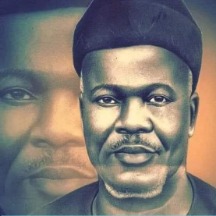A growing number of West Africans are using the N'ko script to write in the Manding languages, of which Mandinka is one and is the most dominant language in The Gambia. Professor Sulayman Kante invented the N'ko script on April 14, 1949. N'ko speakers in Guinea Conakry, Mali, and The Gambia celebrate this day.
In the Gambia, some colleagues and I decided to host a virtual celebration this year with N'ko teacher Abdoulie Saibou Dampha, an advocate. My colleague Foday Ceesay spoke about the history of the N'ko script and the importance of learning to write it.
Karamo (Mandinka for teacher) Dampha states, "The reason I teach N'ko is to make our people understand that we can write our language without Latin, Arabic, or any other script."
Professor Kante faced many challenges and setbacks and conducted many experiments to find the most suitable script for N'ko. He first wrote N'ko using the Arabic alphabet, but people ignored his efforts because they needed help understanding. He decided to abandon that and tried the Latin alphabet, but that, too, was unsuccessful. The people he consulted did not believe we could write our language and understand, especially the sciences, using that script.
Another challenge was that testers could not accurately write some of our Mandinka/N'ko words in Latin and Arabic. He then decided to work on an independent script that could perfectly write our language. He completed his work on April 14, 1949.
During this year's virtual celebration, Ceesay addressed some common misunderstandings about the N'ko script. He clarified, "The N'ko script is not here to compete with Arabic, English, or any other script.
Its purpose is to empower our people to write and communicate in our language, a language that is often overlooked in the global linguistic landscape.
Manding Speakers Celebrated the Development of Their Own Script

Learning the N'ko script not only preserves our cultural identity but also provides a practical solution to the language barriers our people often face.
We encourage everyone to embark on this journey, as it is not only easier but also more rewarding to write and communicate in our languages."<
From Our Archives
Sulaymani Kante: Inventor of N'ko/Mandinka Alphabet
Port of Harlem Exhibit Breaks Colonial Mode and Makes History
("From These Shores, or "Kabo Nying Fankas," in Mandinka, also includes a panel on the N'ko script, the first of such panel in the Juffureh, North Bank, The Gambia institution..)
The Incredible Quest to Preserve a Dying South African Language
Lorato Trok and The Politics and Economics of Language
Sabata-mpho Mokae, Pridefully Keeping His Language Alive
Publisher Fodeh Baldeh – On Speaking and Writing Perfect English
From Our Archives
Sulaymani Kante: Inventor of N'ko/Mandinka Alphabet
Port of Harlem Exhibit Breaks Colonial Mode and Makes History
("From These Shores, or "Kabo Nying Fankas," in Mandinka, also includes a panel on the N'ko script, the first of such panel in the Juffureh, North Bank, The Gambia institution..)
The Incredible Quest to Preserve a Dying South African Language
Lorato Trok and The Politics and Economics of Language
Sabata-mpho Mokae, Pridefully Keeping His Language Alive
Publisher Fodeh Baldeh – On Speaking and Writing Perfect English
Advertisers | Contact Us | Events | Links | Media Kit | Our Company | Payments Pier
Press Room | Print Cover Stories Archives | Electronic Issues and Talk Radio Archives | Writer's Guidelines






